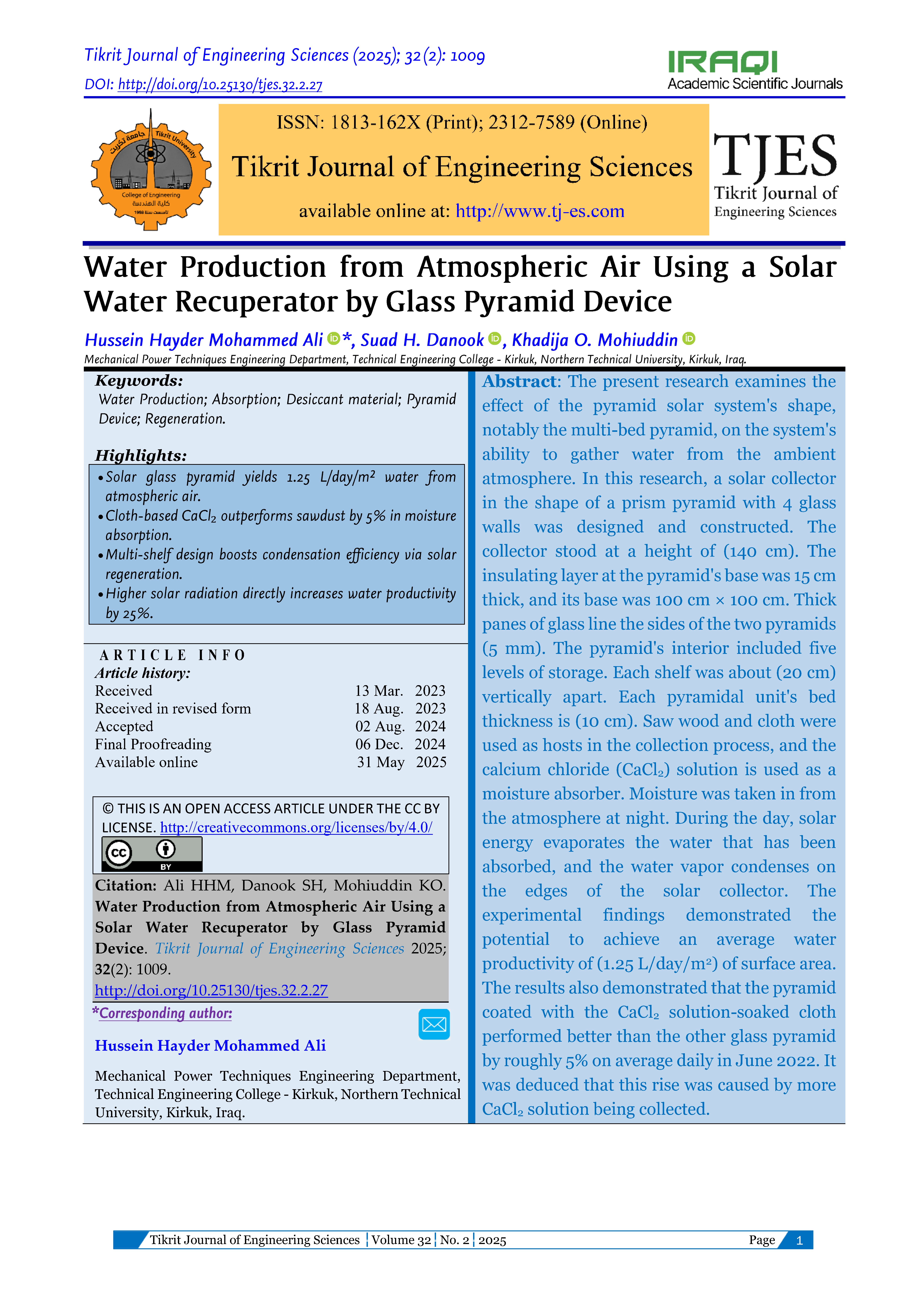Water Production from Atmospheric Air Using a Solar Water Recuperator by Glass Pyramid Device
Main Article Content
Abstract
The present research examines the effect of the pyramid solar system's shape, notably the multi-bed pyramid, on the system's ability to gather water from the ambient atmosphere. In this research, a solar collector in the shape of a prism pyramid with 4 glass walls was designed and constructed. The collector stood at a height of (140 cm). The insulating layer at the pyramid's base was 15 cm thick, and its base was 100 cm × 100 cm. Thick panes of glass line the sides of the two pyramids (5 mm). The pyramid's interior included five levels of storage. Each shelf was about (20 cm) vertically apart. Each pyramidal unit's bed thickness is (10 cm). Saw wood and cloth were used as hosts in the collection process, and the calcium chloride (CaCl2) solution is used as a moisture absorber. Moisture was taken in from the atmosphere at night. During the day, solar energy evaporates the water that has been absorbed, and the water vapor condenses on the edges of the solar collector. The experimental findings demonstrated the potential to achieve an average water productivity of (1.25 L/day/m2) of surface area. The results also demonstrated that the pyramid coated with the CaCl2 solution-soaked cloth performed better than the other glass pyramid by roughly 5% on average daily in June 2022. It was deduced that this rise was caused by more CaCl2 solution being collected.
Metrics
Article Details

This work is licensed under a Creative Commons Attribution 4.0 International License.
THIS IS AN OPEN ACCESS ARTICLE UNDER THE CC BY LICENSE http://creativecommons.org/licenses/by/4.0/
Plaudit
References
Kumar M, Yadav A. Experimental Investigation of Solar Powered Water Production from Atmospheric Air by Using Composite Desiccant Material “CaCl2/Saw Wood”. Desalination 2015; 367:216-222. DOI: https://doi.org/10.1016/j.desal.2015.04.009
Hussein HMA, Sabah TA. Physical and Chemical Characteristics Comparison of the Drinking Water and Water Produced from the Conventional and Modification Solar Water Distillery. Engineering and Technology Journal 2019; 37(6):214-221. DOI: https://doi.org/10.30684/etj.37.6A.5
Sabah TA, Hussein HMA. Experimental Investigation of New Design of Solar Water Distillation Coupled with Flat Plate Solar Water Collector. The Iraqi Journal for Mechanical and Material Engineering 2020; 20(3):193-207. DOI: https://doi.org/10.32852/iqjfmme.v20i3.512
Hamed AM. Absorption–Regeneration Cycle for Production of Water from Air-Theoretical Approach. Renewable Energy 2000; 19(4):625-635. DOI: https://doi.org/10.1016/S0960-1481(99)00068-3
Hamed AM, Kabeel AE, Zeidan ESB, Aly AA. A Technical Review on the Extraction of Water from Atmospheric Air in Arid Zones. JP Journal of Heat and Mass Transfer 2010; 4(3):213-228.
Hall RC. Theoretical Calculations on the Production of Water from the Atmosphere by Absorption with Subsequent Recovery in a Solar Still. Solar Energy 1966; 10(1):41-45. DOI: https://doi.org/10.1016/0038-092X(66)90071-5
Alayli Y, Hadji NE, Leblond J. A New Process for the Extraction of Water from Air. Desalination 1987; 67:227-229. DOI: https://doi.org/10.1016/0011-9164(87)90246-3
Gad HE, Hamed AM, El-Sharkawy II. Application of a Solar Desiccant/Collector System for Water Recovery from Atmospheric Air. Renewable Energy 2001; 22(4):541-556. DOI: https://doi.org/10.1016/S0960-1481(00)00112-9
Kabeel AE. Application of Sandy Bed Solar Collector System for Water Extraction from Air. International Journal of Energy Research 2006; 30(6):381-394. DOI: https://doi.org/10.1002/er.1155
Kabeel AE. Water Production from Air Using Multi-Shelves Solar Glass Pyramid System. Renewable Energy 2007; 32(1):157-172. DOI: https://doi.org/10.1016/j.renene.2006.01.015
Ji JG, Wang RZ, Li LX. New Composite Adsorbent for Solar-Driven Fresh Water Production from the Atmosphere. Desalination 2007; 212(1-3):176-182. DOI: https://doi.org/10.1016/j.desal.2006.10.008
Hamed AM, Aly AA, Zeidan ESB. Application of Solar Energy for Recovery of Water from Atmospheric Air in Climatic Zones of Saudi Arabia. Natural Resources 2011; 2(1):1-14. DOI: https://doi.org/10.4236/nr.2011.21002
William GE, Mohamed MH, Fatouh M. Desiccant System for Water Production from Humid Air Using Solar Energy. Energy 2015; 90:1707-1720. DOI: https://doi.org/10.1016/j.energy.2015.06.125
Kumar PM, Arunthathi S, Prasanth SJ, Aswin T, Antony AA, Daniel D, Mohankumar D. Investigation on a Desiccant Based Solar Water Recuperator for Generating Water from Atmospheric Air. Materials Today: Proceedings 2021; 45:7881-7884. DOI: https://doi.org/10.1016/j.matpr.2020.12.506
Ademola AA. Theoretical and Experimental Analysis of Atmospheric Water Harvesting Device. Canadian Society for Mechanical Engineering International Congress 2020:1-8.
Tawfeeq WM, Marwah NM, Muhammad AE, Thamir KI. A Theoretical Study to Incorporate Capillary Tubes Action and Evaporation Process as Green Energy Techniques for Water Lifting. Tikrit Journal of Engineering Sciences 2023; 30(4):159-166. DOI: https://doi.org/10.25130/tjes.30.4.17
Hussam SD, Manar SM, Thamir KI, Sirine C, Mounir B. Closed Solar Air Heater System Integrated with PCM (RT42 and RT50) in a Thermal Storage-Finned Heat Exchanger Unit. Tikrit Journal of Engineering Sciences 2023; 30(3):27-37. DOI: https://doi.org/10.25130/tjes.30.3.4
Adnan MH, Hussein HMA, Zahraa HMA. Assessing the Efficacy of Flat-Plate Solar Collectors Using Nanofluids in the Climatic Context of Kirkuk City, Iraq. Acta Polytechnica 2024; 64(1):25-33. DOI: https://doi.org/10.14311/AP.2024.64.0025
Hussein HMA, Sahar YA. Assessing the Economic Viability of Solar Distillation Employing a Rotating Hollow Cylinder. International Journal of Heat & Technology 2024; 42(2):613-619. DOI: https://doi.org/10.18280/ijht.420228
Anwar SB, Ali NM, Ali HM. An Effect of Binary Fluid on the Thermal Performance of Pulsation Heat Pipe. International Journal of Applied Mechanics and Engineering 2022; 27(1):21-34. DOI: https://doi.org/10.2478/ijame-2022-0002
Ali HHM, Hussein AM, Allami KMH, Mohamad B. Evaluation of Shell and Tube Heat Exchanger Performance by Using ZnO/Water Nanofluids. Journal of Harbin Institute of Technology (New Series) 2023; 30:1-13. DOI: https://doi.org/10.1007/978-981-19-3227-4_1
Mohammed AJ, Ali HHM, Barrak AS, Hussein AM, Mohammed MR. Enhancement of Turbulent Heat Transfer by Using CuO Nano-Particle and Twisted Tape. Pollack Periodica 2024; 19(3):115–121. DOI: https://doi.org/10.1556/606.2024.00985
Ali HHM, Mohammed AJ, Alshukri MJ, Hussien AM, Alsabery AI. Numerical Study on Entropy Minimization in Pipes with Helical Airfoil and CuO Nanoparticle Integration. Open Engineering 2024; 14(1):20220594. DOI: https://doi.org/10.1515/eng-2022-0594
Adnan MH, Afrah TA, Hussein HMA. Evaluation of the Thermal Efficiency of Nanofluid Flows in Flat Plate Solar Collector. Journal of Thermal Engineering 2024; 10(2):299-307. DOI: https://doi.org/10.18186/thermal.1448578
Nawfal MA, Anwar SB, Anees A, Hussein HMA, Sinan MM. Effect of Darrieus Vertical Axis Wind Turbine Type H-Straight and Blades Number on the Turbine Performance at Low Wind Speed. AIP Conference Proceedings 2024; 3105(1):040005. DOI: https://doi.org/10.1063/5.0212196
Hussein HMA, Fatima AT. Enhancing Heat Exchanger Performance with the Use of Nano Fluids, Twisted Tubes and Tape. AIP Conference Proceedings 2024; 3122(1):100017. DOI: https://doi.org/10.1063/5.0216170





